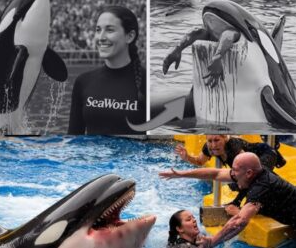A tragic incident at a renowned marine park has left the global animal care community stunned and reignited fierce debate over the ethics of keeping large marine mammals in captivity. Jessica Radcliffe, a 26-year-old marine trainer known for her skill, dedication, and deep bond with marine life, was killed after a performing killer dolphin suddenly turned aggressive during a routine show.
The fatal encounter, which was captured on video and has since gone viral, shows what began as a familiar, seemingly seamless performance turning into a harrowing struggle for life. Witnesses describe a sudden and dramatic change in the dolphin’s behavior. Without warning, the massive animal lunged, seizing Radcliffe and dragging her beneath the surface.
Trainers rushed to intervene, but the animal’s sheer size and power rendered rescue efforts nearly impossible. After several tense minutes, the dolphin released Radcliffe, but it was too late.
The marine park released a statement expressing “profound sadness” at the loss of one of its “most dedicated and beloved team members,” confirming that all live shows have been suspended pending an internal investigation.
Radcliffe, admired by colleagues for her calm demeanor and celebrated by audiences for her passion, had worked with the animal for several years. Friends say she was deeply committed to marine conservation and believed her work helped educate the public about ocean wildlife.
While the park has yet to determine the cause of the animal’s sudden aggression, marine biologists point to the well-documented risks of captivity. In the wild, killer dolphins—often referred to as orcas—can travel up to 100 miles a day in close-knit family pods, engaging in complex hunting and communication behaviors. Confinement, even in the largest tanks, offers only a fraction of that range and can lead to both physical decline and psychological distress.
Dr. Emily Carver, a marine mammal specialist, told reporters:
“We cannot underestimate the mental toll captivity takes on these animals. They’re not domesticated pets—they are highly intelligent ocean predators with instincts and needs that can’t be suppressed by training.”
The tragedy has sparked an outpouring of grief, as well as renewed calls from animal rights organizations for an end to orca performances. Hashtags such as #JusticeForJessica and #EmptyTheTanks have been trending, with many sharing the footage alongside demands for stronger animal welfare laws.
Critics argue that such performances distort the public’s understanding of these creatures’ natural behavior and come at the cost of animal welfare and human safety. Supporters of marine parks maintain that these shows provide educational value and inspire conservation efforts, though incidents like this continue to fuel opposition.
Jessica Radcliffe’s death now joins a list of high-profile trainer fatalities that have forced marine parks to confront the dangers inherent in close human-animal interactions. For many, her story is a sobering reminder that wild animals—especially apex predators—retain instincts and power that cannot be fully tamed in a controlled environment.
As the investigation continues, the incident has prompted a difficult question that will not soon fade: can the needs of such animals ever truly be met in captivity, and at what cost to both them and the humans who care for them?
